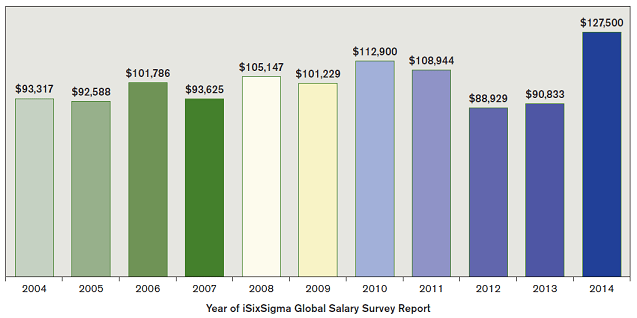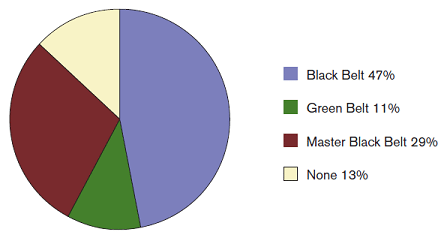
The following are selected highlights of the 11th Annual iSixSigma Global Salary Survey. The complete report, with more analysis and extended findings is available for purchase on the iSixSigma Marketplace. It includes discussion of:
- The disappearance of bonuses,
- How many years of experience you need to see your compensation levels jump and
- How certification and education relate to salary and bonus levels.
Black Belt Salaries Stagnate
According to respondents of the 11th Annual iSixSigma Global Salary Survey, the average annual worldwide Black Belt (BB) salary declined $224, a decrease of less than 1 percent. The difference is not statistically significant, indicating that salaries have not substantially changed over the past year. Only time will tell if this stagnation is the beginning of a reversal in the overall upward trend of average salaries in the decade since this research was first undertaken, or simply part of the pattern of continued gradual increase over time (Figure 1).

Champions
The average salary of Champions, on the other hand, increased dramatically to $127,500, the highest average salary worldwide for Champions since the iSixSigma salary survey first began in 2004. However, with so few Champion data points, not too much can be read into this. Last year the average salary for Champions was $90,833, and $88,929 in the 2012 report (Figure 2).

Business Professionals
Although BPs may not be in Six Sigma roles currently, nearly half of these professionals (47 percent) are certified as BBs and 29 percent are certified as MBBs (Figure 3).

How the Survey Is Completed
Data for the Annual iSixSigma Global Salary Survey is collected from the iSixSigma Job Shop, where participants answer several required questions (e.g., location, highest level of education, salary range, etc.). Only information from those who provided or updated their information within the prior 12 months was included in the analysis.
This year’s salary survey includes responses from 1,391 participants.
Please note: Survey participants provide salary information by ranges, beginning at < $20,000, then $20,001 to $25,000, continuing at increments of $5,000 to the final salary range of > $200,000. In analyzing the salary data, each range was converted to the median salary for that specific range. For example, < $20,000 was calculated to be $17,500; $20,001 to $25,000 was calculated to be $22,500; and so on.
Role Definitions
Black Belt: Full-time professional who leads Six Sigma projects. Typically has four to five weeks of classroom training in methods, statistical tools and team skills. Sometimes provides coaching and Six Sigma expertise to Green Belts.
Master Black Belt: An expert in Six Sigma methodology and statistical tools who provides strategic Six Sigma guidance within a specific function or business unit. An MBB often has prior experience as a BB. Responsible for coaching, mentoring and/or training BBs, an MBB often helps the Six Sigma Deployment Leader and Champions keep the initiative on track.
Champion: Middle- or senior-level executive who sponsors a specific Six Sigma project or effort, ensuring that resources are available and cross-functional issues are resolved.
Deployment Leader: Senior-level executive responsible for implementing Six Sigma enterprise wide. Typically reports to higher C-level executives. Responsible for developing, implementing and maintaining a standardized, company-wide quality system focused on customer satisfaction, defect prevention and continuous improvement.
Quality Professional and Quality Executive: While not universally regarded as Six Sigma roles, QPs and QEs may have Six Sigma responsibilities and qualifications.
Business Professional: Although they may not be in Six Sigma roles currently, the majority of these professionals possess Six Sigma certification and may have project experience.
Extended findings include of the 11th Annual iSixSigma Global Salary Survey with additional analysis is available for purchase on the iSixSigma Marketplace. It includes discussion of:
- The disappearance of bonuses,
- How many years of experience you need to see your compensation levels jump
- How certification and education relate to salary and bonus levels.